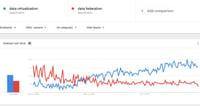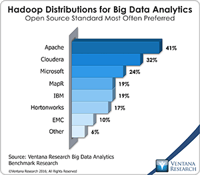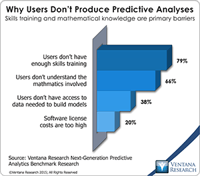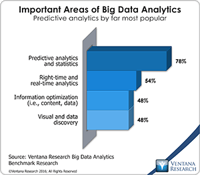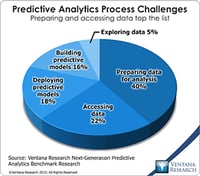Data virtualization is not new, but it has changed over the years. The term describes a process of combining data on the fly from multiple sources rather than copying that data into a common repository such as a data warehouse or a data lake, which I have written about. There are many reasons for an organization concerned with managing its data to consider data virtualization, most stemming from the fact that the data does not have to be copied to a new location. It could, for instance,...
Read More
Topics:
Big Data,
Business Analytics,
Business Intelligence,
Data Integration,
Data Lake,
Information Applications,
Information Management,
Data Virtualization
On Monday, March 21, Informatica, a vendor of information management software, announced Big Data Management version 10.1. My colleague Mark Smith covered the introduction of v. 10.0 late last year, along with Informatica’s expansion from data integration to broader data management. Informatica’s Big Data Management 10.1 release offers new capabilities, including for the hot topic of self-service data preparation for Hadoop, which Informatica is calling Intelligent Data Lake. The term “data...
Read More
Topics:
Big Data,
Business Intelligence,
Data Governance,
Data Preparation,
Informatica,
Information Applications,
Information Management,
Uncategorized,
Strata+Hadoop
I recently attended the SAS Analyst Summit in Steamboat Springs, Colo. (Twitter Hashtag #SASSB) The event offers an occasion for the company to discuss its direction and to assess its strengths and potential weaknesses. SAS is privately held, so customers and prospects cannot subject its performance to the same level of scrutiny as public companies, and thus events like this one provide a valuable source of additional information.
Read More
Topics:
Big Data,
Predictive Analytics,
SAS,
Analytics,
Business Analytics,
Business Collaboration,
Business Intelligence,
Business Performance,
Information Applications,
Information Management,
Uncategorized,
Visualization
Throughout the course of our research in 2016, we’ll be exploring ways in which organizations can maximize the value of their data. Ventana Research believes that analytics is the engine and data is the fuel to power better business decisions. Several themes emerged from our benchmark research on incorporating data and analytics into organizational processes, and we will follow them in our 2016 Business Analytics Research Agenda:
Read More
Topics:
Big Data,
Predictive Analytics,
Analytics,
Business Analytics,
Business Collaboration,
Business Intelligence,
Cloud Computing,
Information Applications,
Information Management,
Operational Intelligence
In our definition, information management encompasses the acquisition, organization, dissemination and use of information by organizations to create and enhance business value. Effective information management ensures optimal access, relevance, timeliness, quality and security of this data with the aim to improve organizational performance. This goal is not easily met, especially as organizations acquire ever more data at an ever faster pace. In our business analytics benchmark research of more...
Read More
Topics:
Data Quality,
Master Data Management,
Social Media,
Analytics,
Business Analytics,
Business Intelligence,
Cloud Computing,
Complex Event Processing,
Data Governance,
Data Integration,
Information Applications,
Information Life Cycle Management,
Information Management,
Operational Intelligence,
IT Performance Management (ITPM)
Talend recently announced version 5 of its information management platform, which emphasizes unifying its various components. Through a combination of development activities, acquisitions and partnerships, Talend has been steadily building its portfolio of information management capabilities. In addition to its core data integration capabilities, it has added data quality, master data management, application integration and with this release business process management (BPM).
Read More
Topics:
Big Data,
Data Quality,
Master Data Management,
Talend,
Business Analytics,
Cloud Computing,
Data Governance,
Data Integration,
Governance, Risk & Compliance (GRC),
Information Applications,
Information Management,
Strata+Hadoop
Kalido recently introduced version 9 of its Information Engine product. The company has been around for 10 years but has had difficulty establishing its identity in the information management market. Kalido was perhaps ahead of its time, partly a vendor of data integration, partly master data management and partly data governance. As an example of the positioning challenge, its core product, Information Engine, while not a data integration tool, could in some cases provide sufficient...
Read More
Topics:
Data Quality,
Data Warehousing,
Master Data Management,
Data Governance,
Data Integration,
Governance, Risk & Compliance (GRC),
Information Applications,
Information Management,
Kalido
In a move that may indicate the beginning of a new wave of activity in the business intelligence (BI) market, Oracle has announced its intention to acquire Endeca. Founded in 1999, Endeca originally focused on search capabilities for online commerce. Users selected a product attribute, and the software automatically revised the remaining selection criteria based on products matching the previous selection. We have been covering Endeca as part of the BI and information applications marketing....
Read More
Topics:
Predictive Analytics,
Sales Performance,
Social Media,
Supply Chain Performance,
Business Analytics,
Business Intelligence,
Business Performance,
Customer & Contact Center,
Financial Performance,
Information Applications,
Workforce Performance
About 30 years ago, perhaps on this very day, I was sitting in front of an Apple II working on a VisiCalc spreadsheet. At the time, I don’t think I even knew who Steve Jobs was. I wasn’t in the software industry yet. I was working for a public accounting firm. The Apple II sat in a corner of the office “typing pool.” For those of you who don’t know what a typing pool was, there was no swimming involved – it was a group of full-time employees with dedicated equipment who did all the typing and...
Read More
Topics:
Mobile,
Sales Performance,
Social Media,
Supply Chain Performance,
Sustainability,
Business Analytics,
Business Collaboration,
Business Intelligence,
Business Mobility,
Business Performance,
Customer & Contact Center,
Financial Performance,
Governance, Risk & Compliance (GRC),
Information Applications,
Information Management,
Location Intelligence,
Operational Intelligence,
Visualization,
IT Performance Management (ITPM)
